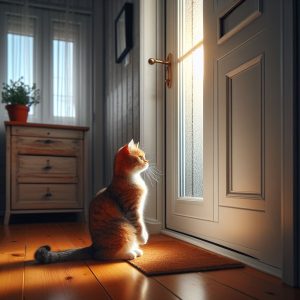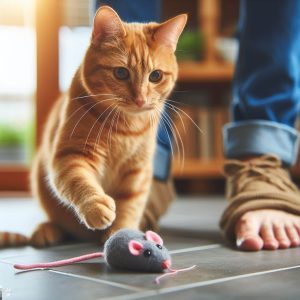Has your furry friend been letting out tiny kitty sneezes recently? Seeing your cat sneeze can be cute at first, but frequent sneezing in cats can be a sign of an underlying issue.
In this comprehensive guide, we’ll explore the common causes behind cat sneezing, when you should be concerned, and the most effective home treatments and tips to help stop your cat from sneezing constantly.
Common Causes of Cat Sneezing
There are many possible reasons why your cat may be sneezing frequently. Here are some of the most common causes:
Upper Respiratory Infections
Upper respiratory infections (URIs) are extremely common in cats. The feline herpesvirus (FHV-1) and feline calicivirus (FCV) are two of the most prevalent URIs in cats.
The symptoms of feline URI include:
- Sneezing
- Runny nose and eyes
- Congestion
- Ulcers in the mouth
- Loss of appetite
- Lethargy
Younger kittens and cats with weakened immune systems are most susceptible. URIs are highly contagious and can spread rapidly between cats in multi-cat households.
Allergies
Allergies are another frequent cause of sneezing and nasal discharge in cats. Common allergy triggers include:
- Pollen
- Dust mites
- Mold spores
- Cigarette smoke
- Certain foods or treats
- Litter dust
- Household cleaners
Cats can develop seasonal allergies, just like humans. They may sneeze more during high pollen times or when exposed to other irritants.
Foreign Objects
Cats are curious creatures and may accidentally inhale or get small foreign objects like dust, dirt, lint, litter or plant material stuck in their nose. This irritation can cause bouts of sneezing as they try to expel the object.
Dental Disease
Inflammation in a cat’s mouth from gingivitis, abscesses or other dental problems can sometimes cause post-nasal drip and sneezing. The infection from their mouth can spread to the nasal passages. Regular dental cleanings and exams help reduce this risk.
Tumors
While less common, nasal tumors or polyps can develop in cats and also lead to chronic sneezing. These abnormal growths obstruct the nasal passages and airways. Tumors tend to appear in older cats.
Respiratory Infections
Bacterial infections, pneumonia, bronchitis, sinusitis or other lower respiratory illnesses can result in sneezing in cats. This is a sign the infection has spread to the upper respiratory tract. Fever, lethargy, coughing, breathing issues can accompany sneezing with respiratory infections.
When to See the Vet for Cat Sneezing
Occasional sneezing is normal for cats. But if your cat is sneezing frequently or excessively, it’s time to make a vet appointment. Contact your vet promptly if your cat has:
- Sneezing that lasts longer than 2 weeks
- Thick nasal discharge
- Difficulty breathing
- Loss of appetite
- Lethargy
- Red, swollen or runny eyes
- Ulcers in mouth
- Fever
- Changes in behavior
Young kittens with URI symptoms should be evaluated right away since the infection can turn serious rapidly. Seek emergency vet care if your cat has severe breathing problems or seems extremely ill.
Your vet will first take a medical history and examine your cat. Tests like blood work, cultures, x-rays or CT scan of the nasal passages and chest may be done to determine the exact cause. Based on the diagnosis, the vet will prescribe the appropriate treatment plan.
Tip: It’s important to isolate sick, sneezy cats from other household pets to prevent spreading the infection. Disinfect food bowls, litter boxes and shared items to control the outbreak.
Home Treatments and Remedies for Cat Sneezing
In mild cases of cat sneezing, there are some helpful home remedies you can try alongside your vet’s treatment plan to help soothe symptoms.
However, don’t attempt to diagnose and treat sneezing on your own without consulting a vet, especially if symptoms persist. Delaying medical care can allow minor issues to progress into more serious illness.
1. Adjust the Environment
If allergies are the culprit, take steps to reduce airborne irritants at home:
- Use air filters and purifiers
- Switch to dust-free cat litter
- Wash bedding weekly in hot water
- Vacuum and dust regularly
- Limit clutter and fabrics
- Create cleaned “safe” rooms
- Ensure good air circulation
- Avoid scented products
- No smoking indoors
Removing the allergen source is key to controlling allergic sneezing. It may take some trial and error to pinpoint the exact trigger.
2. Try a Saline Spray
Gently applying a saline nasal spray can help moisturize dry nasal passages and clear mucus. This may temporarily relieve sneezing. Avoid sprays containing medication – consult your vet first.
Tilt your cat’s head back a little and spray the saline into each nostril, then wipe away any discharge. This works best with two people. Give your cat a treat afterwards so they don’t dread it.
3. Adjust the Litter Box
Cats with respiratory illness may stop using the litter box. Try a different style box or litter that has less dust. Scoop waste daily and change litter weekly. Multiple boxes around the home can make it easier too.
4. Offer Immune Boosting Foods
Feeding your cat foods rich in vitamin C, vitamin A and antioxidants can give their immune system a healthy boost to fight off infection. Try cooked chicken, tuna, pumpkin, broccoli, berries or yogurt. Avoid milk products in cats.
5. Diffuse Essential Oils
Some people find gently diffusing certain essential oils like eucalyptus, tea tree or chamomile in their home helps open up sinus passages and suppress sneezing. Always dilute oils and research safety for cats first.
6. Adjust Grooming Habits
Gently wipe your cat’s face after meals with a warm, damp cloth to remove any food, milk or treats that may be stuck to their face and cause sneezing. Brush your cat regularly to remove dead hair they could inhale.
7. Use a Humidifier
Dry air can further irritate inflamed nasal passages. Running a humidifier in your cat’s favorite room can add needed moisture back to the air and make breathing easier. Clean humidifiers regularly to prevent mold.
8. Give Medications as Directed
If your vet prescribes any medications like antibiotics, decongestants or antihistamines, carefully follow the dosing directions. Give all medications as prescribed until completed – even if your cat seems better. Stopping too soon can lead to recurring or resistant infections.
Preventing Future Sneezing Episodes
While sneezing can’t be fully prevented, there are ways to lower risks and keep your kitty’s nose healthy long-term:
- Vaccinate kittens and adult cats annually – Core FVRCP vaccines protect against the most common sneeze-causing viruses
- Avoid taking in strays or shelter cats without isolation – These cats are more prone to harbor contagious sneezing illnesses that can infect household cats
- Have new kittens and cats vet checked before introducing them to your home and resident cats
- Spay/neuter your cat – Intact cats are more prone to fighting injuries and bites that lead to abscesses/infections spreading to the nose and mouth
- Don’t allow cats to drink from toilet bowls or puddles – This can introduce foreign irritants and infectious agents leading to sneezing
- Brush teeth routinely – Regular dental cleanings reduce dental disease-related sneezing
- Avoid irritating litters and perfumes – Use dust-free, unscented litters and gentle, fragrance-free cleaning products
- Don’t smoke indoors or let cats outside unattended – Both can expose cats to respiratory irritants and illness
- Reduce stress – Stress weakens immunity making cats prone to catch URI viruses. Provide exercise, play, scratching posts, high resting perches, routine and their own safe “space”.
- Feed a high-quality diet – Nutrition fuels the immune system. Choose a balanced cat food tailored for your cat’s age and health issues.
By identifying triggers, treating any underlying illness, and keeping your cat’s immune system strong, you can successfully reduce irritating sneezing. But never hesitate to call your vet if sneezing persists or your cat seems unwell. With prompt care, kitty colds usually resolve within 7-10 days.
Frequently Asked Questions
Is it normal for cats to sneeze?
An occasional sneeze is normal, but frequent sneezing or excessive nasal discharge is a sign your cat may be sick. Contact your vet if excessive sneezing lasts longer than 2 weeks.
Are cat sneezes contagious to humans?
Human colds are caused by rhinoviruses that are species-specific. So you can’t catch your cat’s upper respiratory infection. But cats can pass certain bacteria to humans, like Bordetella. So always wash hands after handling a sneezy cat to prevent any rare transmission.
How long does a URI last in cats?
With proper treatment and care, most uncomplicated upper respiratory infections in cats resolve within 7-10 days. But some chronic viral infections can come and go throughout a cat’s lifetime during periods of stress or if immunity declines.
When should I take my cat to the ER for sneezing?
Seek emergency vet care right away if your cat has difficulty breathing, bluish gums/tongue, collapse or loss of consciousness. These signs can indicate pneumonia, blockages, heart problems and require immediate medical intervention.
Can I give my cat Benadryl for sneezing?
Never give your cat any medication without consulting your vet. OTC antihistamines like Benadryl can actually cause harm in cats when used incorrectly. Your vet will prescribe cat-safe medications in appropriate dosages if needed.
Why does my cat reverse sneeze?
Reverse sneezing is a rapid inhale through the nose that sounds like your cat is choking or sniffing. It’s caused by nasal irritation or obstruction. Episodes are usually short and self-resolve. If reverse sneezing becomes frequent or severe, see your vet.
Frequent sneezing and nasal discharge is no fun for cats or their owners. But in most cases, sneezing is temporary and treatable. By identifying the root cause, treating any infection present, and removing irritants, you can help your kitty breathe easy and get back to their happy, playful self.



